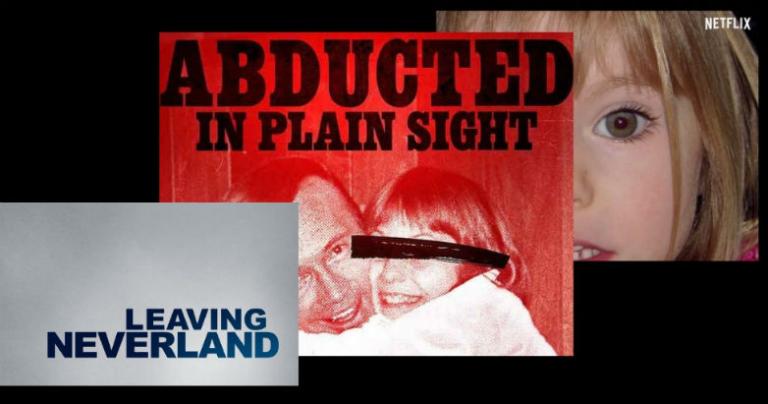 Since the child sex-abuse scandal broke, many have asked, “How could this have happened? Why didn’t we see it?” Three recent documentaries may offer answers. They’re not comforting, but they’re important.
Since the child sex-abuse scandal broke, many have asked, “How could this have happened? Why didn’t we see it?” Three recent documentaries may offer answers. They’re not comforting, but they’re important.
First, the docs:
Leaving Neverland (HBO)
In the two-part film, produced and directed by British filmmaker Dan Reed, now-adult Wade Robson and James Safechuck recount their allegations of childhood sex abuse against Michael Jackson. Their tales also include descriptions of grooming behaviors and ways in which they claim Jackson manipulated their parents to facilitate abuse.
While these accusations have not been adjudicated (and now that Jackson is dead, never will be), the grooming techniques and the part played by the parents may have seemed outrageous if I hadn’t also seen …
Abducted in Plain Sight (Netflix)
The 2017 documentary from Top Knot Films was released this year on Netflix. Set in the 1970s, it centers on neighboring LDS families in Idaho, the Brobergs and the Berchtolds. The Berchtold father, Robert, became obsessed with 12-year-old Jan Broberg and embarked on a multifaceted, masterful, sexual manipulation of her and her parents, culminating in two separate abductions, rape and a “marriage” in Mexico.
To gain control of Jan, Berchtold had sexual contact with both parents — including a months-long affair with the mother — and told abducted Jan an elaborate tale involving aliens, a baby and a mission to save the world.
The now-adult Jan, her sisters and her parents cooperate and appear in the film, with often-disturbing frankness about what happened.
The Disappearance of Madeleine McCann (Netflix)
The eight-part true-crime series, directed by Emmy nominee Chris Smith (the recent Fyre), walks viewers through what happened after a British 3-year-old vanished from her bed while vacationing with her family at a resort community in Portugal (the parents were having dinner with other parents at a nearby restaurant).
Wild allegations and speculations have circulated for years, but in the last couple of episodes, the film focuses on the theory of human traffickers. While it can’t be proved that happened to the McCann child, the investigation did lead to the uncovering of a large pedophile ring in Spain.
What I Learned From Each One
Obviously, what’s discussed in Leaving Neverland hasn’t been proven in court (and both men have sworn under oath that what they say happened, didn’t). But, just for the sake of argument (and because allegations of this sort are not unique to this case), let’s assume for the moment that their sex-abuse stories are true. Why would these boys’ parents have allowed this to happen?
They could have been dazzled by celebrity, lured by the luxurious life that proximity to celebrity can bring, seduced by the idea of how this celebrity could make their child rich and famous, and delighted by the notion that someone rich and beloved had singled out their child (and by extension, them) for special attention.
In short, they could neither believe that such a thing was possible from a beloved celebrity, nor would they want to believe it.
Here, I saw a similarity to Abducted in Plain Sight. The Brobergs appear to be incredibly naive and trusting, sexually unsophisticated and simply unwilling to accept that a fellow Mormon, a small-town business owner like themselves, could be capable of as horrible a thing as raping their daughter.
When Berchtold went into therapy and later told the Brobergs that lying in bed next to their daughter was part of his therapy, they accepted and allowed it. (Warning: you may have to suppress an urge to throw things at the screen while watching this; I did.)
But, remember, this was the ’70s, and information about pathologies like Berchtold’s just wasn’t out there in the public, especially for Mormon parents in Idaho. Also, in that decade, and ones before it, it was believed that therapy could actually cure men like Berchtold (or like abusive priests). We laugh at that idea now, but now is not then.
Added to these two films for me is a third story, The Demon Next Door, an audiobook by Bryan Burroughs (available through Audible)
In it, Burroughs tells the story of serial killer/rapist Danny Corwin, who grew up in the same hometown as Burroughs — Temple, Texas. But, Burroughs never heard the story of his crimes until recently.
Corwin was the churchgoing son of prominent congregants in the town’s Presbyterian community, some members of which responded to Corwin’s first teenage arrest for sexual assault by disbelieving the accusations and blaming the victim.
Later on, church members disputed among themselves whether to forgive Corwin and welcome him back, some still having trouble accepting that he did what he did. After all, he grew up in their church; his parents were upstanding church and community members.
Corwin died by lethal injection in Texas in 1998, at the age of 40, having been convicted of raping and murdering two women (but those weren’t his only victims).
Lastly, there’s the McCann story. The parents — who appear to be faithful Anglicans — said they and others from their dinner party returned regularly to check on the children. They were probably concerned about ordinary perils, like getting into something in the kitchen, or nightmares.
If indeed a human-trafficking ring snatched the blond toddler, it’s easy to think the parents never extended their imagination to that possibility. Most parents, at what they consider a safe vacation spot, probably wouldn’t.
What’s most telling to me is one of the police officers interviewed, in discussing the huge pedophile ring uncovered, says that, if this was counterterrorism, it would be all over the news, that we would devote huge resources to it.
But, he points out, people can only look into the abyss, into the dark hearts of monsters, for so long. Then, they can’t take it anymore and have to look away.
Do Abusers Target Certain People and Communities?
I’ve been thinking about the kinds of communities and groups where child abuse happens, and often, it has a lot to do with trust.
Obviously, most abuse happens in families, from people who should, in a perfect world, be the first you trust. When that trust is betrayed, it’s hard to understand and to escape. It’s your family, after all.
Then, it can happen among those who are focused on a goal and willing to make extreme sacrifices for it. That could be an Olympic athlete or an aspiring performer. The children and families are locked into the pursuit of something, and consciously or unconsciously, may think that the price of acknowledging abuse may be too high. (This happens to adults as well, when exposing an abuser can upend a career or a vocation.)
Abuse happens in public and private schools, and organizations like the Boy Scouts, where trusted adults are put in charge of other people’s children. If you think about it, if a predator wishes to get close to prey, what better job than one that puts him — or her — in regular contact with children, especially those over whom the predator has authority?
And it happens in religious communities, not just Catholics, but Protestants, Jews, Mormons and so on. People trust their clergy and fellow believers, to the point of being unable or unwilling to believe victims or even the evidence of their own eyes. Watching your spiritual leaders or brethren fall can tear at the fabric of belief itself. The price of seeing it may seem much higher than the price of averting eyes.
The Difference Between Forgiveness and Turning a Blind Eye
I also wonder if the nature of Christianity itself makes us particularly at risk. We’re told to forgive, to encourage repentance, to turn the other cheek. When you’re dealing with a true monster, all these feelings and precepts can be twisted to his or her advantage. Over and over again, we’ve heard of clergy targeting vulnerable youngsters — such as fatherless boys — and adults under their power.
There’s a reason that a wolf would rather snatch a lamb than take on a full-grown ram.
As Matthew 10:16 says, “Behold, I am sending you like sheep in the midst of wolves; so be shrewd as serpents and simple as doves.”
Sometimes, we remember the dove part and forget the serpent.
The above productions should probably be required viewing for anyone who wants to understand how such evil could have been perpetrated under the noses of good people.
We should never underestimate the ability of people to not see what’s right in front of them, to rationalize away behavior they can’t bear to acknowledge, to find any way to keep an illusion alive, even at the cost of the most innocent.
Fighting Evil Wherever It Is
Also, anyone who pursues sex-abuse investigations against the Church but doesn’t show equal vigor in pursuing abusers wherever they come up isn’t truly interested in saving children, but just in tearing down the Church. These crimes have to be prosecuted everywhere, because they happen everywhere — because evil is everywhere.
But so is good, and good will triumph if good people refuse to back down from confronting evil, no matter how painful or embarrassing that may be. In a way, what’s happening to the Catholic Church is a cautionary tale and, if we are willing to accept it and change what needs to change, we can lead the way for others.
What better role — or Cross — for Christ’s Pilgrim Church on Earth?
Faith is real; God is real; Christ is real; and the Church is the Bride of Christ. But our best impulses can also make us vulnerable to evil. The constant challenge will be how to cling to Christ but keep our eyes wide open.
Images: HBO/Netflix
Don’t miss a thing: head over to my other home, as Social Media Manager at Family Theater Productions; and check out FTP’s Faith & Family Media Blog, and our YouTube Channel.














